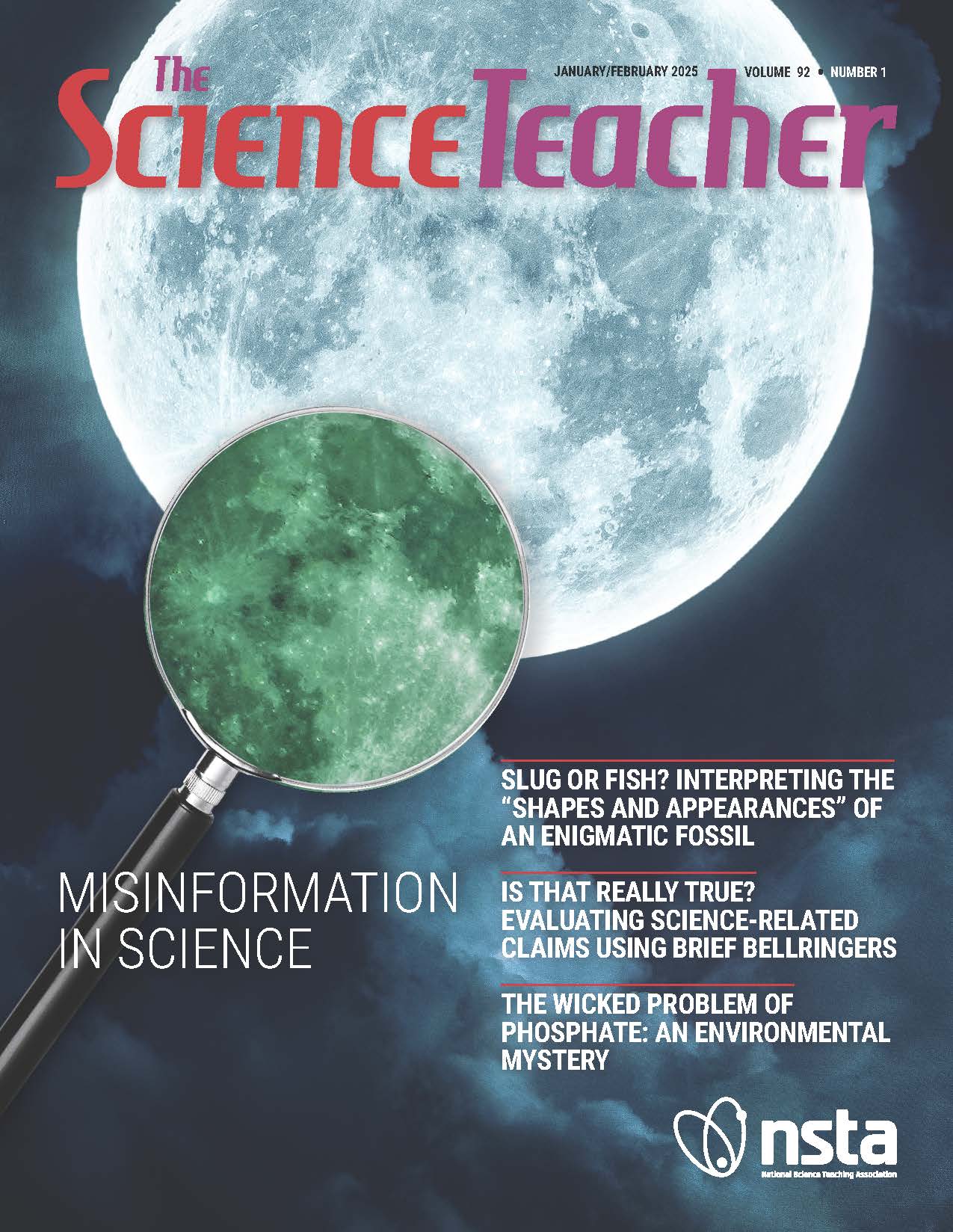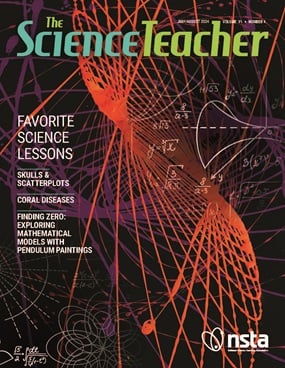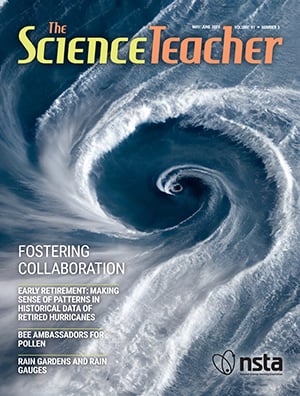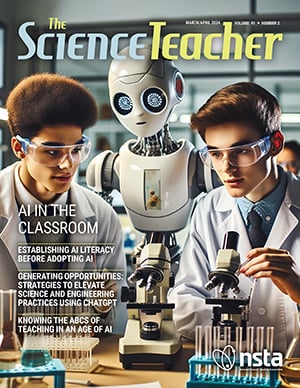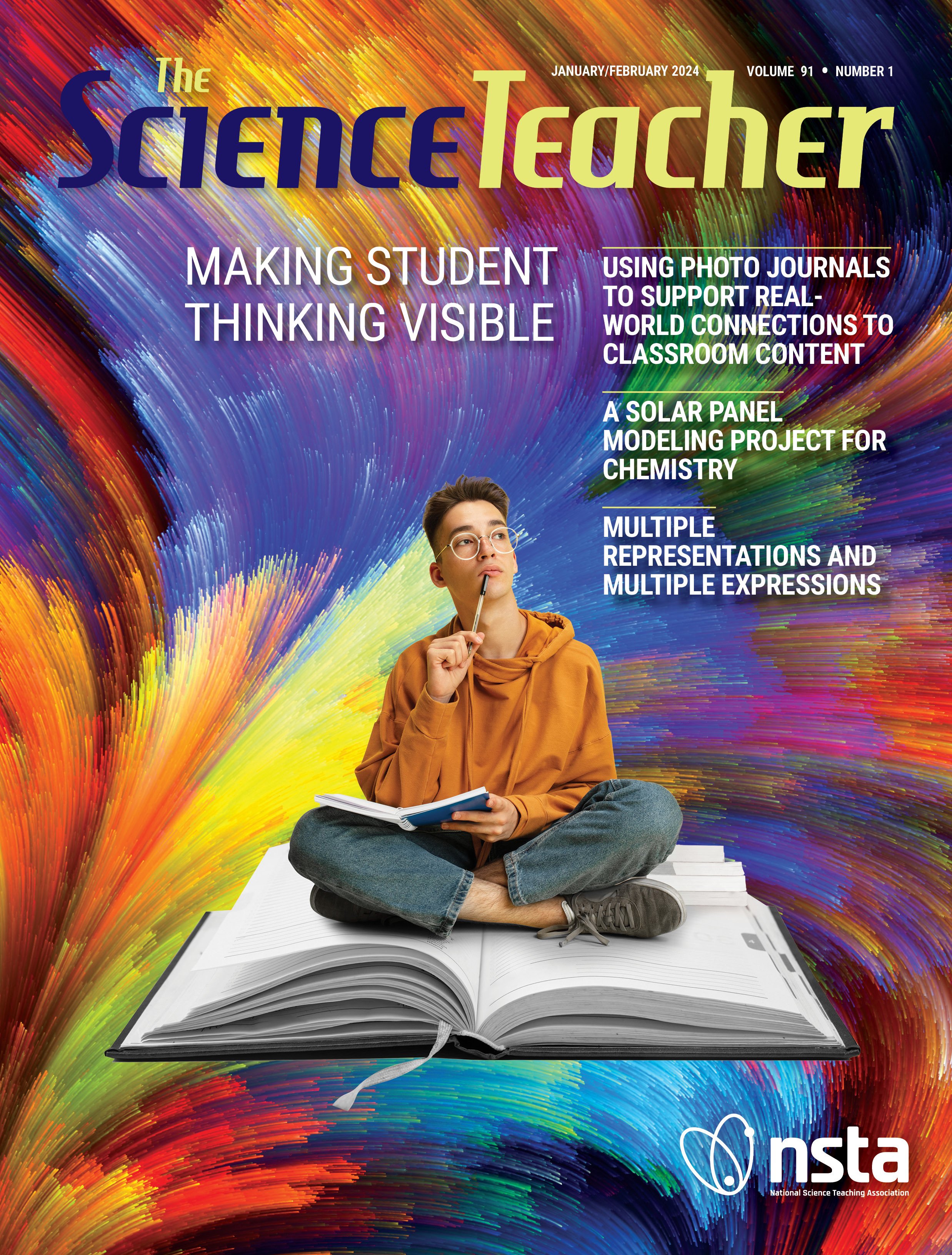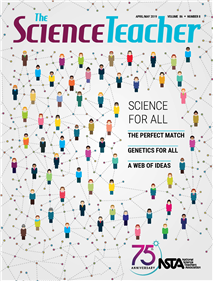MyNSTA Community
The Science Teacher
Read NSTA's award-winning, peer-reviewed practitioner journal for secondary level and high school science teachers, sign up for new article alerts, and more!
Latest Issues
Archives
Recent Issues
Recent Issues
Journal
The Science Teacher—July/August 2023
Volume 90, Number 6 Engaging All Students in Our Science Classes Making science engaging for ALL students requires each of us to know our students as learners with individual interests and identities. Through the common components of science ...
Journal
The Science Teacher—May/June 2023
Volume 90, Number 5 May/June 2023 Promoting Scientific Literacy Scientific literacy means understanding how science is done, what is science versus non-science, and how to evaluate claims we are exposed to on a daily basis....
Journal
The Science Teacher—March/April 2023
Volume 90, Number 4 March/April 2023 Creating a Scientific Classroom Community Can we use ecology as a metaphor for the science classroom? Is there a way for students, teachers, curriculum, and learning experiences to thrive and be a commu...
Journal
The Science Teacher—January/February 2023
Special Issue on Immunology Guest Editors: Colby Tofel-Grehl and Brooke A. Whitworth The COVID-19 pandemic laid bare the absence of resources for teachers to engage students in learning about infectious disease as both a socio-scientific issu...
High School Biology Crosscutting Concepts Life Science News Science and Engineering Practices Three-Dimensional Learning
Journal
The Science Teacher—November/December 2022
November/December 2022 Volume 90, Number 2 Many proponents of direct instruction believe it cuts down on classroom management issues. Sure, maybe it breeds fear and intimidation among the students, but then their love of learning science plum...
Journal
The Science Teacher—September/October 2022
Volume 90, Number 1 Alternative Assessments in the Science Classroom When I say “assessments,” what immediately comes to your mind? Tests, quizzes, and exams? Does it always have to be that way? As you know, there are two main categori...
Journal
The Science Teacher—May/June 2022
May/June 2022 Volume 89, Number 5 Welcoming. Listening. Open-mindedness. Common ground. Social identities. Respecting. Suspending judgment. Authenticity. Purposeful. Positionality. Inclusive strategies in our science classes include all of...
Journal
The Science Teacher—January/February 2022
Volume 89, Number 3 Data Analysis in the Science Classroom This issue provides myriad examples of discovering, examining, and interpreting data in the science classroom. ...
Journal
The Science Teacher—November/December 2021
Volume 89, Number 2 Culturally Relevant Science Pedagogy Validating students’ cultural identities in classroom practices—such as understanding and integrating the students’ family makeup, immigration history and experiences, individual ...
Journal
The Science Teacher—September/October 2021
Volume 89, Number 1 September/October 2021 In this social justice-themed issue, we look at examples of educators implementing lessons, labs, and activities that make classrooms more critically-just places. Their work is to be applauded and em...
Journal
The Science Teacher—March/April 2021
Volume 88, Number 4, March/April 2021 Technology Innovations in Science Teaching This issue of The Science Teacher focuses on technological innovations in the science classroom. Modelling software, data analysis, and virtual scientific tours ...
Journal
The Science Teacher—November/December 2020
Volume 88, Number 2 Interdisciplinary Science ...
Journal
The Science Teacher—September/October 2020
Volume 88, Number 1 Evaluating Scientific Claims ...
Journal
The Science Teacher—July/August 2020
Volume 87, No. 9 Equity for All How can we, as science educators, erase inequitable practices in our teaching? Digital Edition ...
Journal
The Science Teacher—April/May 2020
Nature and the Environment Volume 87, No. 8 Digital Edition ...
Journal
The Science Teacher—March 2020
Volume 87, Number 7 Making science come alive and having students address critical social issues creates a more socially just environment, where all students truly are created equal. ...
Journal
The Science Teacher—February 2020
Volume 87, Number 6 The word assessment conjures up many questions for science teachers. Is it a necessary evil? When is it helpful and beneficial? What is lost during the mandatory weeks of proctoring standardized exams to our overtested, str...
Journal
The Science Teacher—January 2020
Volume 87, Number 5 Fake news. Pseudoscience. Bad Science. Never before has so much information, both good and bad, been available to us. If our students graduate knowing the steps of the Krebs cycle but cannot re...
Journal
The Science Teacher—November/December 2019
Volume 87, Number 4 Learning on Personal Devices Tablets, cell phones, and other handheld devices have become increasingly popular tools to help students learn. In this issue we examine innovative ways teachers have incorporated handheld de...
Journal
The Science Teacher—October 2019
Teaching the periodic table is a central part of chemistry, whether it involves memorizing the symbols of the elements, learning about the properties of the families, or understanding its general organization. This year, The International Year of the...
Journal
The Science Teacher—September 2019
Our legacy as science teachers revolves around the memories we make with our students. Make memories. Leave a legacy. ...
Journal
The Science Teacher—August 2019
As early as 1896, Swedish Nobel Prize winner Svante Arrhenius presented a hypothesis demonstrating that doubling the carbon dioxide content in Earth’s atmosphere would lead to a warming of its climate. By the 1950s, the higher temperatures Arrheniu...
Journal
The Next Generation Science Standards (NGSS Lead States 2013) weave connections to the nature of science into every standard. The NGSS note that “Science is both a set of practices and the historical accumulation of knowledge… students should dev...







